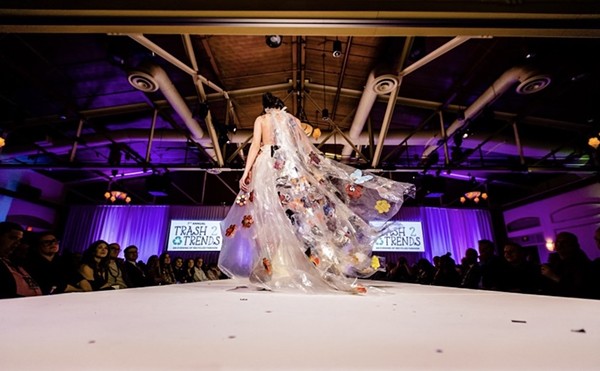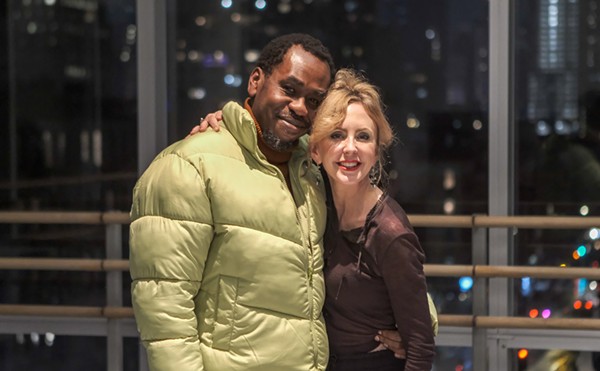I'm all about original homegrown works, but it's also great seeing Orlando companies mount polished versions of published works. This week we look at two dramatically different local productions that both demonstrate how deconstructing cherished icons of the past can help us face current challenges.
Clybourne Park at Mad Cow Theatre
Here we are, eight years into America's glorious post-racial era, and for some reason our society hasn't yet solved all our centuries-old problems, or even found civil ways of communicating about them. (Thanks, Obama.) We obviously can't have a cross-cultural conversation about race via the Internet, if the #BlackLivesMatter/ #AllLivesMatter hashtag war is any indication, and anyone who watched last week's Republican debate debacle knows politics isn't the place either.
Could the theater be our last, best venue for the straight talk on color that so many seem to crave? As a suburbs-bred Jew, I'm just about the least qualified person to ask. But Bruce Norris' Tony and Pulitzer-winning play Clybourne Park posits that the answer is yes, if we can dare to laugh in the face of such a serious subject.
In 1959, Russ (Thomas Ouellette) and his wife Bev (Robin Olson) are in the midst of moving out of their Chicago home when their loquacious neighbor Karl (Matt Horohoe) barges in with his pregnant wife (Sarah French), demanding they halt the sale to buyers who happen to be "colored." (Observant theatergoers will recognize this plot as the flip side of Lorraine Hansberry's A Raisin in the Sun, the first Broadway play by a black woman, but knowledge of the original isn't necessary.) Bev's well-intentioned liberalism and Russ' depression-induced apathy run up against Karl's racism, and their long-suffering maid (Trenell Mooring) and her husband (Michael Sapp) are awkwardly dragged into the debate.
After intermission, a half-century has passed in the same now-dilapidated home (credit designer William Elliott's clever change-over), with the actors returning in new semi-related roles. Now Horohoe and French are the outsiders, seeking to demolish the house to build their dream McMansion over the objections of Mooring and Sapp, who are leading a neighborhood petition against their plans. Their opposition is ostensibly about "historical preservation" and "gentrification," but at its root is tribalism, just as it was (albeit with uglier words) decades ago.
Bobbie Bell, a scholar of Brecht, was a brilliant choice to direct this show; he balances passionate politics with sharp slapstick, blurring the line between comedy and drama to a thrillingly uncomfortable degree. He also hit it out of the park in his casting, assembling actors that shift adroitly from Golden Age sitcom to contemporary dramedy without dropping a beat. Particular applause goes to Ouellette, for his grief-stricken growling; French, for her expressive sign language in the first act and passive-aggressive smiling in the second; and Mooring, who seems the most sensible one on stage until her inner Donald Trump is unleashed.
This isn't the show for the polite or politically correct – "My sister was raped" is one of the less offensive laugh lines – but as several characters say, "You can't live in a principle." Perhaps a sophisticated conversation on race is too much to hope for, but as a crude confrontation with the never-ending "color question," Clybourne Park makes an excellent start.
Dog Sees God at Parliament House
Dog Sees God: Confessions of a Teenage Blockhead, Bert V. Royal's salacious satire on Charles M. Schulz's classic Peanuts comic strip, may not confront the subject of race, but it does tackle nearly every other hot-button issue affecting teenagers. High-schooler Chuck B (Christopher Walen) has just buried his beloved beagle, leaving the bowl-cut blockhead wondering if all dogs really go to heaven.
His sister (Madeline Elise) has transformed into a vaping Wiccan; his best friend, Van (Zachary Lane) is a Buddhist stoner; and pals Tricia (Julianne Snyder) and Marcy (Veronica Kelly) have morphed into alcoholic mean girls. When CB stands up to homophobic germaphobe Matt's (Campbell Gilliland) merciless bullying of meek musician Beethoven (Chris Metz), it leads him and his friends to question their deepest identities.
Just as I didn't expect to laugh out loud at Clybourne Park, I was caught off-guard by how emotionally effective director David Lee and his team made Dog Sees God, and found myself wiping away tears during C.B.'s final message from his long-silent pen pal. But don't be put off by the (good) grief; though it involves serious subjects like suicide, school violence, sizeism and the origins of the spork, this show stays smartly silly throughout – especially when Van's pyromaniac sister (Rachel Comeau) makes her lithium-fueled cameo. Lee makes good use of the theater aisles, color-changing LED cubes and Vince Guaraldi's piano themes to connect the comic panel-like scenelets into a vibrant Sunday strip. Don't let my words wash over you like "wah wah wah"; see this show, and you'll never look at Snoopy the same again.

















